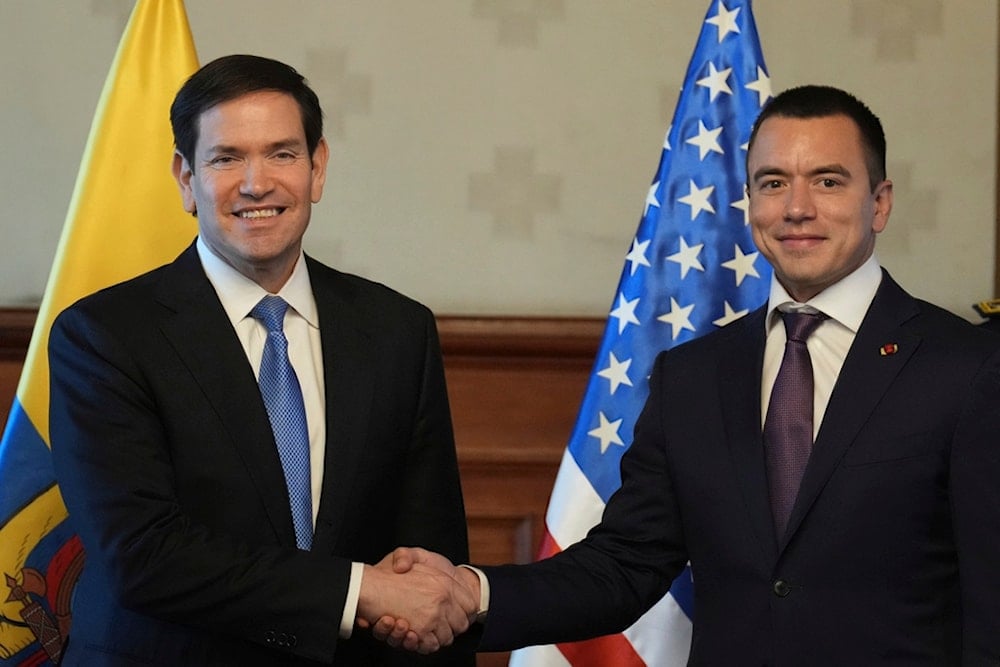US bases in Ecuador spark sovereignty debate under Noboa presidency
Ecuador’s president has confirmed plans to host US bases, with US Homeland Security set to define their locations.
-

US Secretary of State Marco Rubio and Ecuador's President Daniel Noboa, right, shake hands at the presidential palace in Quito, Ecuador, Thursday, September 4, 2025 (AP, Pool)
Plans to establish US bases in Ecuador have ignited debate over sovereignty and constitutional limits, after Ecuadorian President Daniel Noboa’s office confirmed that US Homeland Security will soon define their locations in the Andean country.
Carolina Jaramillo, spokesperson for Noboa, said on Monday that US Secretary of Homeland Security Kristi Noem will visit Ecuador to oversee the plan. The announcement comes amid a national strike called by the Confederation of Indigenous Nationalities of Ecuador (CONAIE) against the elimination of the diesel subsidy.
Legal experts noted that Ecuador’s Constitution explicitly prohibits foreign military bases. Noboa has called for a referendum to consult citizens, though the announcement was made before the public vote.
“Social organizations and analysts warn that moving forward with agreements of this nature without a popular mandate violates the country’s sovereignty and constitutional order,” reported TeleSUR correspondent Elena Rodriguez.
Critics argue that hosting US bases in Ecuador represents a dangerous erosion of sovereignty and a violation of the constitutional ban on foreign military installations.
Read more: Five charged with 2023 assassination of Ecuador presidential candidate
Opposition from CONAIE and civil society
CONAIE, Ecuador’s largest Indigenous organization, has linked its opposition to both the economic measures of the Noboa administration and the decision to host US military forces. The strike underscores growing public unrest over policies seen as favoring Washington’s interests over Ecuador’s sovereignty.
The US-born Ecuadorian president has aligned closely with Washington, framing the partnership as part of Ecuador’s war on drug trafficking. Ecuador currently has one of the highest homicide rates in Latin America, which the government cites as justification for deepening security cooperation.
In July, Homeland Security Secretary Kristi Noem met Noboa to expand cooperation. Discussions included sharing biometric information on criminals, terrorists, and gang members to improve law enforcement coordination.
Last week, US Southern Command chief Adm. Alvin Holsey visited Ecuador and delivered a radar system to improve airspace monitoring. During the visit, officials signed a Memorandum of Agreement on communications security to facilitate the secure exchange of information.
According to the US Embassy, the radar will “significantly improve Ecuador’s ability to monitor its airspace, detect illicit activities, and combat transnational criminal organizations.”
Read more: China fires back after Hegseth calls country 'threat to Panama canal'
Ecuador’s strategic role in US Latin America policy
By moving forward with US bases in Ecuador, Noboa is positioning the country as one of Washington’s main allies in the region. Critics, however, warn that this comes at the expense of national sovereignty and risks deepening tensions with civil society movements opposed to foreign military presence.
In April of this year, Noboa said in an interview for CNN, "We would like to cooperate with US forces, and I think there are many ways that we can do that, especially in monitoring illegal operations that move out of Ecuador, but the control of the operations will be in the hands of our military and our police."

 3 Min Read
3 Min Read









